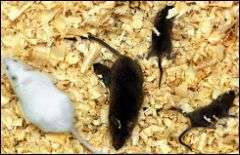Researchers design mouse with more human-like immune response

Medical scientists at the University of Southern California (USC) have bred a first-of-its-kind mouse model that possesses an immune response system more like a human's. The discovery makes way for quicker and more cost-effective development of next-generation drugs to treat human diseases like cancer, diabetes and tuberculosis.
Medical researchers have long used mice and rats to help formulate new drugs and vaccines, in part because their genetic and biological characteristics closely parallel human physiology. But mice are not humans, and many experimental drugs that work extraordinarily well in rodents fail miserably when tested in people. One such drug, α-galactosylceramide (α-GalCer), essentially wipes out cancerous tumors in mice by activating the body's immune system; for reasons not entirely clear, the drug does not trigger the same response in people with cancer.
Scientists hypothesize that the failure to translate is due to subtle differences between the CD1d molecules in mice and humans and how they respond to tumors and infection. CD1d molecules are found on certain cells that trigger the body's innate immune response. In a study to be published by the Proceedings of the National Academy of Sciences the week of Feb. 4, USC researchers describe how they genetically engineered mice to express CD1d molecules that look more like those in humans and in more similar proportions. More importantly, the humanized CD1d molecules effectively trigger natural killer T (NKT) cells—a recently discovered type of white blood cell that attacks tumors and infection—in live animals when exposed to α-GalCer.
"It's the best model we have in the field," said Weiming Yuan, Ph.D., assistant professor of molecular microbiology and immunology at the Keck School of Medicine of USC and principal investigator of the study. "We've basically set a platform to fast-track the identification of immunotherapies that can kill cancer and also make vaccines stronger."
Once activated, NKT cells react in a matter of hours whereas other T cells may take days. This rapid response makes them difficult to study, but also an ideal target for drug-makers. Yuan's humanized mouse allows scientists to more accurately test the viability of those NKT cell-targeting drugs before going to human clinical trials.
"Before, it would have been a guess as to whether the drug would work in people. Now, the chance of success goes from 1 out of 100 to 1 out of 5," Yuan said.
Yuan and colleagues have yet to demonstrate the effects of inserting a more human-like version of the final component of the CD1d/NKT system, the T cell receptor. More experiments are necessary to determine why α-GalCer is ineffective in treating people with cancer and to develop novel α-GalCer derivatives that work with the human immune system.















